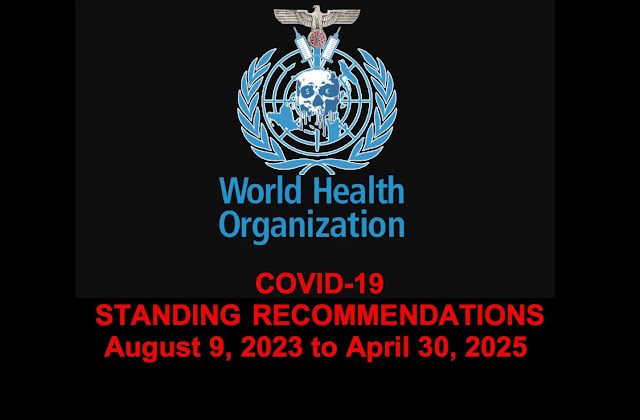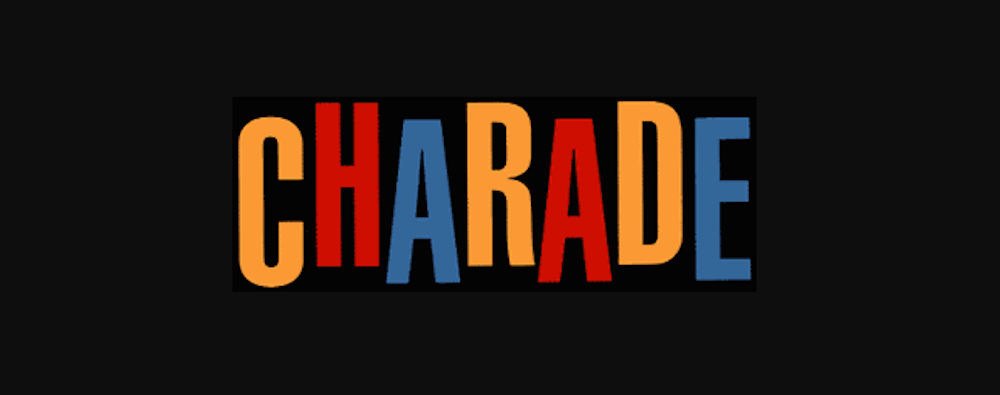WHO COVID-19 Standing Recommendations - 09AUG23 - 30APR25
The Director-General of the World Health Organization (WHO) has issued "Standing Recommendations for COVID-19 in accordance with the International Health Regulations (2005) (IHR).
The Director-General of the World Health Organization has issued “standing recommendations” regarding COVID-19.
These standing recommendations will be in effect from August 9, 2023 to April 30, 2025.
The use of standing recommendations will help with the transition from the emergency phase of the response, which included the use of temporary recommendations, to the new normal, as we increasingly bring COVID-19 into the mainstream of infectious disease management.
For months, I have been saying that THE WHO IS SIMPLY GOING TO IMPLEMENT the very things that they are PRETENDING TO BE NEGOTIATING in regards to the proposed amendments to the International Health Regulations and the proposed WHO CA+ Framework Convention.
The WHO’s standing recommendations encourage the 194 member nations to begin implementing the very things that the WHO is pretending to be negotiating in the proposed amendments to the International Health Regulations and the “Bureau’s Text” of the WHO CA+ Framework Convention:
Multi-source surveillance
Testing and sequencing capacities
Infodemic management
Surveillance in sentinel populations
Genomic sequencing
Event-based surveillance
Wastewater or environmental surveillance
Sero-surveillance (FYI: Sero-surveillance provides estimates of antibody levels against infectious diseases.)
Surveillance in animal populations.
Support the enhancement of surveillance using a One Health Approach to better understand SARS-CoV-2 circulation and evolution in animals.
Improve efforts to increase COVID-19 vaccination coverage
Address vaccine misinformation and disinformation
Expand the manufacturing capacity of diagnostics, therapeutics and vaccines for COVID-19
Support authorization of diagnostics, therapeutics and vaccines
Some excerpts from the standing recomendations…
2. Sustain national and sub-national capacities, as appropriate, for preparedness, prevention, and response for COVID-19… These capacities may include multi-source surveillance, risk assessment, testing and sequencing capacities, infection prevention and control, clinical management, planning and delivery of mass gathering events, risk communication and community engagement, infodemic management, public health and social measures, and access to and use of medical countermeasures.
If anyone comprehends why “planning and delivery of mass gathering events” is included in this list, your insight will be very much appreciated.
5. Incorporate information from different COVID-19 monitoring systems to ensure detection of early warning signals and prepare to scale up and adapt systems, as needed. Include, as applicable, surveillance in sentinel populations, genomic sequencing, event-based surveillance, wastewater or environmental surveillance, sero-surveillance, clinical severity assessment, and surveillance in animal populations. Support the enhancement of surveillance using a One Health Approach to better understand SARS-CoV-2 circulation and evolution in animals.
12. Improve efforts to increase COVID-19 vaccination coverage for all people in the high- priority groups using COVID-19 vaccines recommended by WHO or vaccines approved by national regulatory authorities, taking into account SAGE recommendations, and continue surveillance of vaccination uptake and adverse events.
Continue surveillance of adverse events caused by the so-called “vaccines”? It would be nice if they would START surveilling and REPORTING adverse events caused by the COVID-19 injectable bioweapon “countermeasures.”
13. Address actively vaccine misinformation, disinformation, acceptance, and demand issues with communities and health care providers.
The primary source of misinformation and disinformation has been the government officials of the member nations. In order to address misinformation and disinformation, they need to take a good, hard look in the mirror.
16.
Understand SARS-CoV-2 transmission patterns and the impact of climate, seasonality and behavior.
Understand the origins of SARS-CoV-2
“Understand transmission patterns?” How about using the Koch postulates to document whether or not person-to-person transmission even exists?
“The impact of climate?”
“The impact of behavior?”
“Understand the origins of SARS-CoV-2?” Yes, it would be nice to identify and detail the origins of SARS-CoV-2.
21. Intensify ongoing efforts, including through global and regional networks, to expand the manufacturing capacity of diagnostics, therapeutics and vaccines for COVID-19.
22. Strengthen regulatory authorities to support efficient and effective authorization of diagnostics, therapeutics and vaccines within national regulatory frameworks.





Comments
Post a Comment